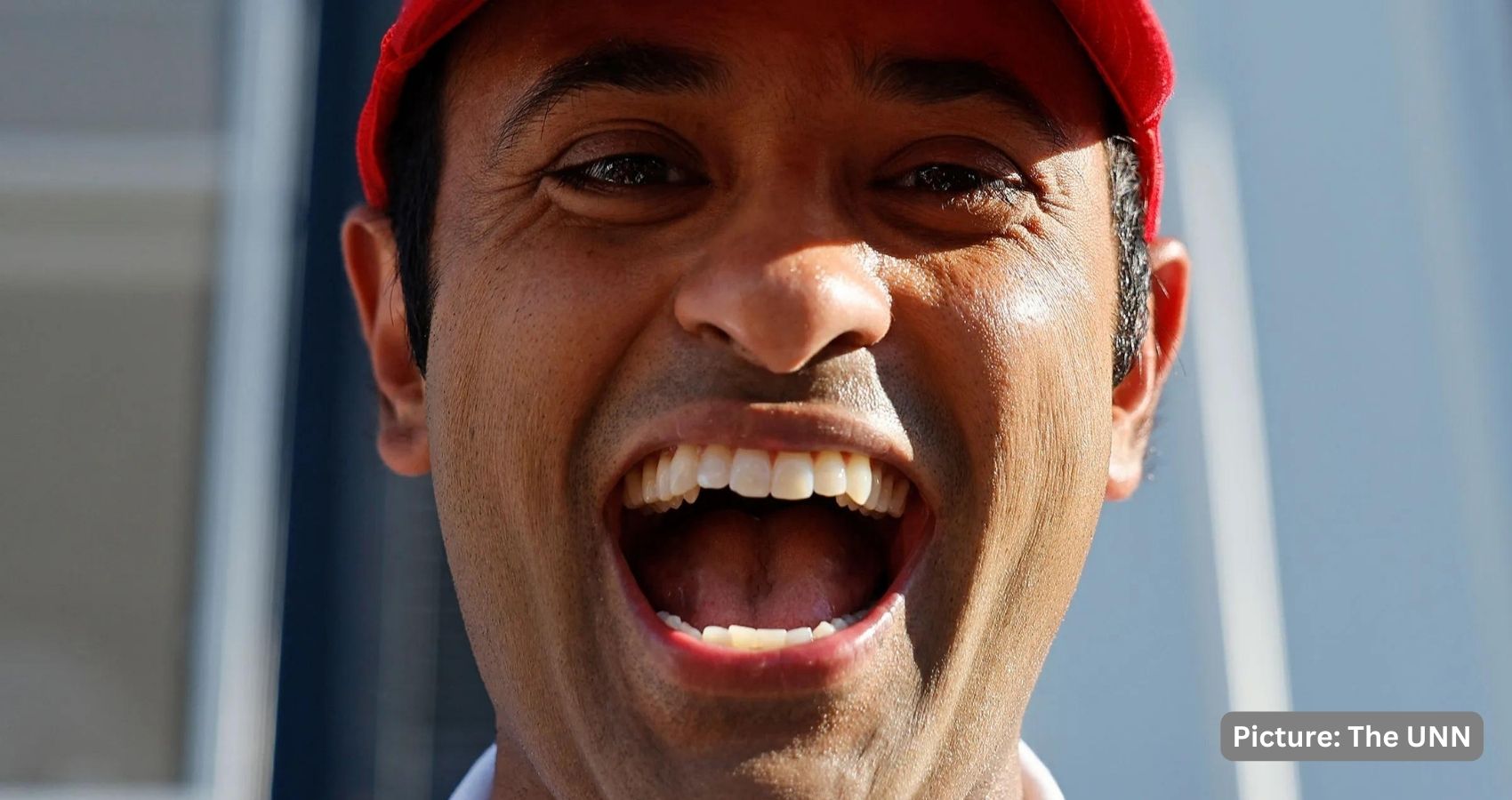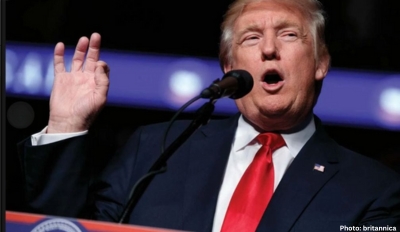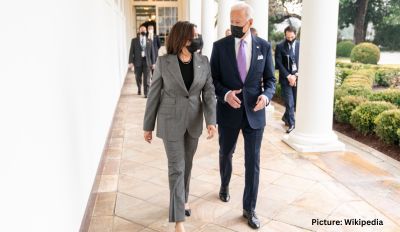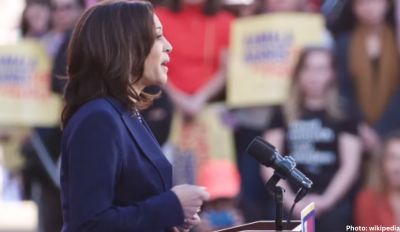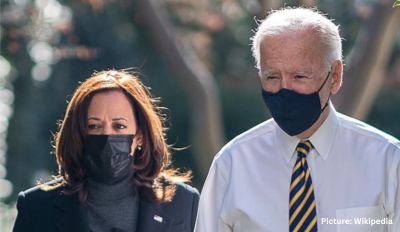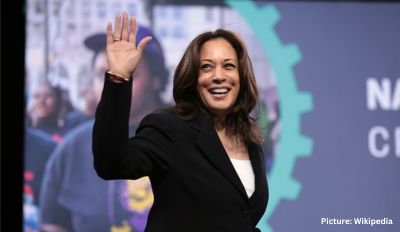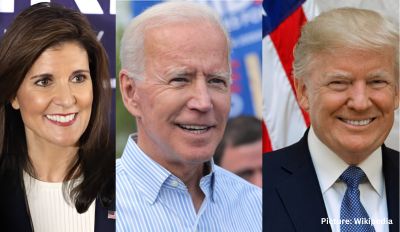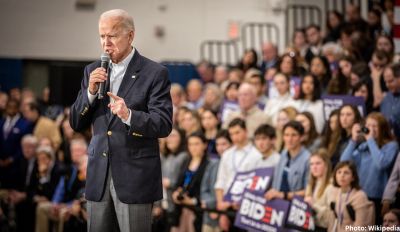Vivek Ramaswamy is currently navigating through the bustling streets of New Hampshire in a crowded Ford Explorer. The Republican contender for the presidential race is managing a whirlwind of campaign stops, engaging in discussions with three journalists while simultaneously conferring with a campaign assistant. During this drive, there’s a brief jolt as the SUV veers onto the highway’s rumble strip, causing Ramaswamy to momentarily startle before promptly resuming his conversation.
In the world of presidential campaigns, the ability to multitask is a necessity – be it handling various tasks while on the move, interacting with constituents, or delivering speeches. However, among the Republican candidates, few exhibit the multitasking prowess of the affluent 38-year-old Ramaswamy. His day has been brimming with activity, starting from his visit to the courthouse in Washington where Donald Trump was to be arraigned, all the way to New Hampshire. Here, he engaged in a lunchtime meet-and-greet and later attended a backyard gathering, addressing attendees and distributing pamphlets outlining his 10 core “truths.” These include statements such as “there are two genders,” “human prosperity depends on fossil fuels,” and “the nuclear family represents the supreme form of governance known to humanity.” During these events, Ramaswamy also shared his plans to dismantle the Department of Education, the Federal Bureau of Investigation, and the Internal Revenue Service. Additionally, he articulated his intent to take the “America First” approach even further than Trump by reducing support for Ukraine and deploying troops to secure the southern border.
Ramaswamy’s strategy of being present everywhere at once, combined with his knack for conveying provocative anti-establishment views in an amiable manner, has propelled him to a prominent position in the GOP primary. Since officially launching his candidacy in February, Ramaswamy’s pace has been relentless. From shaking hands in New Hampshire to rapping Eminem lyrics in Iowa, from featuring on over 70 podcasts to appearing on a plethora of news programs, and generating a consistent stream of online content, he has outperformed many governors and even a former vice president in the early primary states. This dynamism has led Ramaswamy to secure second or third place in various national polls, garnering attention as a major contender.
Sarah Longwell, a Republican pollster who conducts focus groups with GOP-leaning voters, noted a shift in perception. While previously, Ramaswamy was scarcely mentioned in discussions while Florida Governor Ron DeSantis was frequently brought up, the tables have now turned. Longwell views Ramaswamy’s campaign approach as one DeSantis could have adopted. “I think that he has been running the kind of campaign that Ron DeSantis should have run,” Longwell commented on Ramaswamy’s strategy.
However, Ramaswamy’s journey ahead won’t be without challenges. The influence of Trump remains dominant in the race, commanding the support of a majority of primary voters as indicated by recent national polls. Furthermore, Ramaswamy hasn’t yet become a target for his fellow contenders, partly due to not being perceived as a significant threat. While Ramaswamy has made strides in winning over the GOP base, Longwell doesn’t consider him a genuine contender for the GOP nomination. She explains, “He’s not really running as a challenger to Trump. He’s running as somebody who’s trying to elevate his brand, elevate his name ID, and simply become a player in politics.”
In contrast, Ramaswamy asserts his intention to secure victory and categorically rejects the idea of joining a potential second Trump administration. The entrepreneur, who asserts billionaire status, has already injected $15 million of his personal funds into his campaign and is willing to contribute an “unlimited” amount. As the debate stage in Milwaukee awaits him on August 23rd, Ramaswamy and his team anticipate capitalizing on the momentum generated through six months of relentless campaigning. Beyond that point, he envisions transitioning to a more traditional campaign approach involving television advertisements and conventional voter engagement methods. By the time the Iowa caucuses arrive in January, Ramaswamy is confident he will have demonstrated to the Republican electorate what a plausible successor to Trump looks like.
Currently, Vivek Ramaswamy finds himself amid the flurry of activities that have become his signature approach. As we share the car ride through New Hampshire, he reserves the final 10 minutes to collect his thoughts and review his phone. While scrolling through his social media feed, he stumbles upon something intriguing – a post on social media that captures his attention. Specifically, it’s a MSNBC clip featuring Al Sharpton’s commentary on Donald Trump’s legal issues. In the clip, Sharpton raises a rhetorical question, “Can you imagine our reading that James Madison or Thomas Jefferson tried to overthrow the government so they can stay in power?”
Ramaswamy responds to this snippet with a chuckle, his eyes twinkling with an understanding that he can leverage this. He starts by recalling an incident from his college days when he posed a question to Sharpton during a news program. Although he doesn’t recall the specifics of that interaction, he capitalizes on the current moment. As our car nears the upcoming campaign stop in Concord, Ramaswamy plays off Sharpton’s comment and tweets a rejoinder: “It was called the American Revolution. We were successful. We won.” This tweet quickly garners over 2 million views.
Earlier in the day, the scene shifts to Milford, where Ramaswamy addresses a gathering of several dozen people in a local grill. Despite the awkwardness of some attendees eating their lunches while standing, there’s palpable interest in this candidate within the crowded field. Amidst the older, casually dressed voters, Ramaswamy stands out in his suit. He dedicates thirteen minutes to delivering his campaign speech and then devotes almost an hour to answering a diverse range of questions, spanning topics from his plans for national unity to his views on modern monetary theory and strategies to address pedophilia. Following this extensive exchange, he engages with those who have lined up for a photo opportunity.
Ramaswamy’s drive and charisma have deep roots. Born in Cincinnati to Indian immigrant parents who pursued the American Dream, his upbringing significantly influenced his worldview. Despite his parents arriving in the U.S. with limited financial resources, his father found work as an engineer and his mother as a psychiatrist. The values he imbibed were more rooted in culture than politics, he tells me during our time in the SUV. He elaborates, “That was sort of what we cared more about—moral foundations.”
During his teenage years, Ramaswamy began absorbing political insights from various sources. One influence was his conservative Christian piano teacher who admired Ronald Reagan. “She probably influenced me with modes of conservative thought that I probably wouldn’t have thought about in the past,” Ramaswamy reflects. He cites the emphasis on family stability and grounding as perspectives he gained from this exposure.
Despite his polished political demeanor, at the time Vivek Ramaswamy was primarily focused on the business realm. His Harvard years saw the co-founding of Campus Venture Network, an initiative supporting student entrepreneurs, and the launch of a college consulting firm. Graduating in 2007, he joined QVT Financial LP, a hedge fund where he achieved partner status by age 28. Concurrently, he pursued legal education at Yale Law School.
Around this juncture, Ramaswamy acknowledges entertaining fleeting thoughts of entering politics. He recalls, “I considered it briefly, the idea of possibly doing it at some point, when I was in law school.” While some in his circle maintain that he wasn’t deeply inclined toward electoral politics at that time, at least one acquaintance from that era shares that Ramaswamy had contemplated dedicating a decade to building a robust business career before embarking on a political journey. This strategy aimed to achieve success that would allow him to uphold his convictions without being influenced by the donor class.
Notably, Ramaswamy claims to have achieved multi-millionaire status by the time he obtained his J.D. in 2013. In the subsequent year, he founded Roivant Sciences, a drug development company aiming to advance stalled medical treatments. Through one of Roivant’s subsidiaries in 2015, he orchestrated the largest initial public offering in the U.S. biotech industry up to that point. While the Alzheimer’s drug central to this IPO faced setbacks, the company achieved success with other treatments, securing FDA approval for therapies addressing prostate cancer and overactive bladder. In 2016, he earned a place on Forbes’ list of richest entrepreneurs under 40, and his wealth soared.
The year 2020 marked a turning point. Ramaswamy’s discomfort grew as he observed corporate advocacy for ESG (environmental, social, and governance) investing. He expressed his concerns in a Wall Street Journal op-ed, asserting that business leaders should refrain from influencing America’s societal and cultural values. The pandemic and the racial justice protests of that year further solidified his stance. An associate, Anson Frericks, recalls Ramaswamy’s frustration, noting instances where his board requested him to take positions on contentious issues related to COVID policies and matters stemming from George Floyd’s death.
In 2021, Ramaswamy relinquished his role as CEO of Roivant and published “Woke, Inc.,” a New York Times bestseller. Subsequently, he gained a regular presence on Fox News. He and Frericks established Strive, an asset management firm emphasizing shareholder value over political agendas. Ramaswamy swiftly penned another book, critiquing victimhood mindsets and identity politics. Amidst numerous appearances on cable news, he considered running for Senate in Ohio.
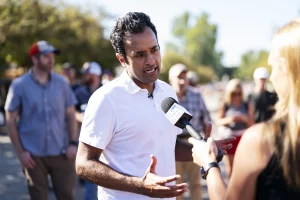
Surprisingly, Ramaswamy announced his candidacy for the presidential race on February 21. His YouTube video launch depicts familiar political-ad visuals, showcasing scenes from a small-town church, workers, families, and children at play. The video transitions into a more critical tone, featuring Dr. Anthony Fauci, climate activist Greta Thunberg, and transgender swimmer Lia Thomas. Ramaswamy’s voiceover voice warns against “COVIDism, climatism, and gender ideology.” The voiceover contends, “We hunger to be part of something bigger than ourselves yet we cannot even answer the question of what it means to be an American.”
The same day the video was released, Ramaswamy outlined his campaign themes on Tucker Carlson’s show. He expounded on core American values like meritocracy, self-governance, and free speech while highlighting how division, spurred by the left, has shifted focus to differences. Carlson commended him, stating, “I hope you’ll come back often, ‘cause you are one of the great talkers we’ve ever had.”
In the ensuing weeks, Ramaswamy embraced an inclusive approach to campaigning, engaging with anyone willing to converse, irrespective of potential detractors. Peter Christopher, a New Hampshire business owner attending Ramaswamy’s lunchtime event, expressed admiration: “He has an understanding of our culture today that he’s not afraid to share. And yet, the way he shares it is not in a way that other people have to be wrong.”
Apoorva Ramaswamy, the candidate’s spouse, emphasizes his enthusiasm for engaging with people, especially those holding opposing views. She notes his passion for being challenged and honing his arguments. Their initial meeting occurred in 2011 when he was attending Yale Law School. Apoorva remarks, “He loves being challenged, being forced to hone his arguments and his thought processes. That’s like his favorite hobby.”
Months of traversing the nation to engage with voters have passed, primarily through town hall meetings in early primary states. Ramaswamy ventures into unusual Republican campaign destinations, such as a Black barbershop in Chicago. These unique interactions generate social media buzz and distinguish him within the crowded Republican field. Paul Davis, a college friend maintaining contact throughout the campaign, reflects, “A lot of these candidates are very afraid of talking to the press… and they’re really worried about, ‘Oh, this outlet is biased, and they’re going to spin it this way, or that way, whatever.”
His educational journey brought him to a predominantly Black middle school in Milford, where he found himself among a diverse student body. He has shared an incident from his eighth-grade year when he was pushed down the stairs by another student, leading to surgery. This event marked a turning point as he transitioned to a Jesuit school, St. Xavier High School, where he became one of the few Indian students in a predominantly white class. In his valedictorian speech, he recollected feeling uncertain during freshman year mass, struggling with the lyrics and when to stand or sit. A sophomore religion class broadened his horizons, helping him explore various viewpoints and shape his own perspective. He expressed, “I’ll definitely remember emerging from St. X with a personal faith that was neither Catholic nor strictly Hindu, but was finally something that I could call my own,” addressing his fellow graduates.
Even during his teenage years, Ramaswamy’s warmth and sociability stood out, allowing him to discuss topics like local sports with ease. However, his unique background set him apart. Only recently did his former business partner, Anson Frericks, a friend from St. Xavier, realize he had been mispronouncing Ramaswamy’s first name for two decades. (The correct pronunciation rhymes with “cake.”) When confronted, Ramaswamy explained that as the only Indian student in an all-male Catholic high school, he grew accustomed to responding to whatever name people used. Frericks shared his perspective, saying, “He’s like, ‘Hey, you know, when you’re the only Indian kid at an all-male Catholic high school, you just take whatever you’re called.”
While pursuing a biology degree at Harvard, Ramaswamy engaged in a plethora of extracurricular activities, from playing club tennis to participating in the South Asian Association. He was deeply involved in leadership roles across various organizations and also explored his artistic side under the alias “Da Vek,” dabbling in rap. He held leadership positions in groups like the Harvard Political Union and the Institute for Politics, and he joined the Harvard Republican Club. He recalls, “I mostly, through college, considered myself a libertarian, a pretty staunch libertarian.”
Ramaswamy was unafraid to voice his opinions against prevailing campus liberalism or engage in debates with his right-leaning peers on issues such as Guantanamo prisoners’ treatment. A notable incident took place in 2007 when then-FBI Director Robert Mueller visited campus. Ramaswamy confronted Mueller with questions about external checks on the FBI with regard to civil liberties. Paul Davis, a friend from the same dorm, remarked, “He just kind of said what he thought about different topics, even if it pissed people off.”
During a trip to Las Vegas, Davis recounted an incident at a blackjack table that highlighted Ramaswamy’s pride in his American identity. When asked about his nationality, Ramaswamy responded, “I’m a citizen of the greatest nation on Earth, the United States of America.” This confident response resonated with the others at the table.
Davis likens his friend’s campaign strategy to that of Transportation Secretary Pete Buttigieg during his 2020 presidential campaign as the relatively unknown mayor of South Bend, Indiana. He notes that Ramaswamy’s approach is about confidently sharing his story across various platforms, despite the potential for unfavorable coverage. Davis acknowledges that while there may be risks involved, they are worth taking.
Starting in April, Ramaswamy has managed to produce over 50 episodes of a podcast called “The Vivek Show.” He engages in in-depth conversations with individuals from diverse political backgrounds, ranging from right-wing commentators like Glenn Beck to Democrat Tom Wolf, the former Governor of Pennsylvania. During these tapings, he turns off his phone—a rare moment of respite in his busy schedule. A second season of the podcast is set to launch in early fall, featuring interviews with figures like Papa John’s founder John Schnatter and Chaya Raichik, the operator of Libs of TikTok.
Ramaswamy’s political stance often leans hard-right: he advocates for cutting federal regulators, ending affirmative action, and argues that transgender children frequently grapple with unrelated mental health issues. However, he also deviates from the typical Republican mold. Although he personally identifies as “pro-life,” he stands out by not supporting a federal abortion ban. His proposals include banning social media for individuals under 16 and eliminating automatic voting rights for those under 25.
The forthcoming GOP presidential debate will offer a platform to present his views to a broader audience. Tricia McLaughlin, a senior advisor to Ramaswamy, notes that the campaign decided to skip traditional debate preparation in favor of maintaining their hectic travel schedule, which has been instrumental in connecting with voters. McLaughlin emphasizes that the campaign’s philosophy revolves around letting Ramaswamy be authentic.
The question of whether Trump participates in the debate introduces an unpredictable element. Ramaswamy has fervently pledged to pardon the former President, who has reciprocated with effusive praise. However, Trump has indicated that his support may shift if Ramaswamy’s poll numbers approach his own.
Ramaswamy remains optimistic about the future. He envisions a more directed campaign path after the first debate, focusing on the early primary states while incorporating more traditional approaches. As the SUV arrives at his next town-hall venue, Ramaswamy reflects on his connection with ordinary people. He reveals that he doesn’t indulge in lavish vacation homes but instead invests in private jets to save time.
After parting ways, the journalist searches for the mentioned interaction between Ramaswamy and Sharpton. A video from 2003 shows an 18-year-old Ramaswamy wearing a light-blue button-down shirt and a shiny watch, asking the first audience question on “Hardball with Chris Matthews.” He inquires why voters should choose the Democratic candidate with the least political experience. Sharpton responds with confidence, noting his extensive political engagement and social policy work over the past three decades.Ramaswamy listens with a grin, nodding in agreement as Sharpton speaks.

